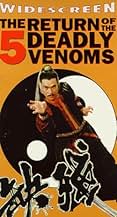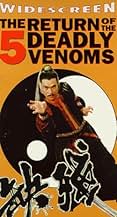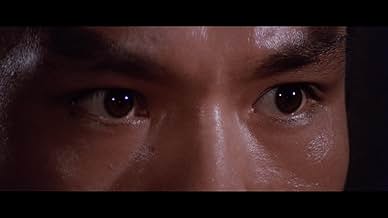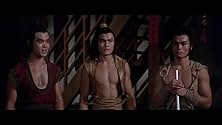AVALIAÇÃO DA IMDb
7,3/10
3,1 mil
SUA AVALIAÇÃO
Três homens, que tiveram membros do corpo removidos por um guerreiro, se tornam amigos e aprendem kung fu para se vingarem.Três homens, que tiveram membros do corpo removidos por um guerreiro, se tornam amigos e aprendem kung fu para se vingarem.Três homens, que tiveram membros do corpo removidos por um guerreiro, se tornam amigos e aprendem kung fu para se vingarem.
Chen Kuan-Tai
- Black Tiger Dao Tian-Du
- (as Kuan Tai Chen)
Phillip Chung-Fung Kwok
- Chen Shun
- (as Kuo Chui)
Helen Poon
- Du's Wife
- (as Ping-Chang Pan)
Dick Wei
- Tien Nan Tiger #1 of the Southern Sky
- (as Lung Tu)
Kin-Ping Chow
- Du's Thug
- (as Chien-Ping Chou)
- Direção
- Roteiristas
- Elenco e equipe completos
- Produção, bilheteria e muito mais no IMDbPro
Enredo
Você sabia?
- CuriosidadesThe film was parodied in the TV episode Futurama: The Series Has Landed (1999), in which a video arcade game called "Mortal Kooperation" is seen that makes fun of it.
- Versões alternativasThe West German version of the film was cut by about 16 minutes in order to secure a "Not Under 18" rating.
- ConexõesFeatured in The Cinema Snob: The Crippled Avengers (2015)
Avaliação em destaque
"All in color, for a dime" - that's what comic books were said to offer in their "Golden Days", action and adventure impossible to perform in "real life", presented in a colorful, but inexpensive, format. Of course nowadays, comic books cost as much as movies, and actually more than "bargain basement" video, such as this re-release of the Shaw Bros. classic "Crippled Avengers".
As I write this, "The Fantastic Four" is going into national release; it is hard to believe that Marvel Comics publisher Stan Lee spent some 30 years trying to get that film made; and it will have cost millions of dollars; and it involves tons of computer-graphic effects; and it is being hyped "4 wall", as the ad-men say, i.e., in every possible media, as if it were the new "Gone With the Wind"; when, after all, it is only a childhood fantasy, however entertaining.
Fortunately, by the time he began making the "Venom" ensemble pictures, famed Hong Kong director Chang Cheh had learned to stop taking such films all that seriously. While the production values of this film are quite good for their day, Chang Cheh is not intent on making a classic here. He merely wants to make a colorful comic book of a movie suggested by Chinese folk legends, allowing the Venom actors (most of whom had actually trained in dance and acrobatics) a chance to show off their athletic talents. And just to be on the safe side, he placed at the center of the film Chen Tai Kwan, a classically trained martial artist who had also developed considerable skill as an actor. His presence adds credibility to what, after all, is itself a childhood fantasy.
For its kind, for its day, this is an exceptional bit of genre fluff; and one has to mention the creative charge brought to this film by a performance ensemble in its prime, and in which everyone is clearly having a great time providing their audience with a great time. This film is just dam' fun to watch, and more than once! One loves these characters, despite the occasional bit of ham, and I repeatedly find myself in awe at the acrobatics of the concluding fight sequence, even though I have seen similar, & more spectacular, feats performed live (i.e., w/o the aid of editing) at a circus. I suppose that's partly because the actors rely as little on the editing as possible, and the director insists on getting as much on film in single takes as possible, and wisely shoots the fights in full-shot, so we can watch these bodies move with as much grace as the actors can conjure. But it's also because all involved are asking their audience to set aside adult judgments on their performance and simply enjoy a well-rehearsed and directed bit of old-fashioned Chinese-style showmanship.
When people say "they don't make them like they used to", this is the kind of film they're talking about. A genre-defining moment in the history of "old-school" kung fu films, this film was frequently imitated, and never bettered.
As I write this, "The Fantastic Four" is going into national release; it is hard to believe that Marvel Comics publisher Stan Lee spent some 30 years trying to get that film made; and it will have cost millions of dollars; and it involves tons of computer-graphic effects; and it is being hyped "4 wall", as the ad-men say, i.e., in every possible media, as if it were the new "Gone With the Wind"; when, after all, it is only a childhood fantasy, however entertaining.
Fortunately, by the time he began making the "Venom" ensemble pictures, famed Hong Kong director Chang Cheh had learned to stop taking such films all that seriously. While the production values of this film are quite good for their day, Chang Cheh is not intent on making a classic here. He merely wants to make a colorful comic book of a movie suggested by Chinese folk legends, allowing the Venom actors (most of whom had actually trained in dance and acrobatics) a chance to show off their athletic talents. And just to be on the safe side, he placed at the center of the film Chen Tai Kwan, a classically trained martial artist who had also developed considerable skill as an actor. His presence adds credibility to what, after all, is itself a childhood fantasy.
For its kind, for its day, this is an exceptional bit of genre fluff; and one has to mention the creative charge brought to this film by a performance ensemble in its prime, and in which everyone is clearly having a great time providing their audience with a great time. This film is just dam' fun to watch, and more than once! One loves these characters, despite the occasional bit of ham, and I repeatedly find myself in awe at the acrobatics of the concluding fight sequence, even though I have seen similar, & more spectacular, feats performed live (i.e., w/o the aid of editing) at a circus. I suppose that's partly because the actors rely as little on the editing as possible, and the director insists on getting as much on film in single takes as possible, and wisely shoots the fights in full-shot, so we can watch these bodies move with as much grace as the actors can conjure. But it's also because all involved are asking their audience to set aside adult judgments on their performance and simply enjoy a well-rehearsed and directed bit of old-fashioned Chinese-style showmanship.
When people say "they don't make them like they used to", this is the kind of film they're talking about. A genre-defining moment in the history of "old-school" kung fu films, this film was frequently imitated, and never bettered.
- winner55
- 8 de jul. de 2005
- Link permanente
Principais escolhas
Faça login para avaliar e ver a lista de recomendações personalizadas
Detalhes
Contribua para esta página
Sugerir uma alteração ou adicionar conteúdo ausente

Principal brecha
By what name was Combate Mortal (1978) officially released in India in English?
Responda


































